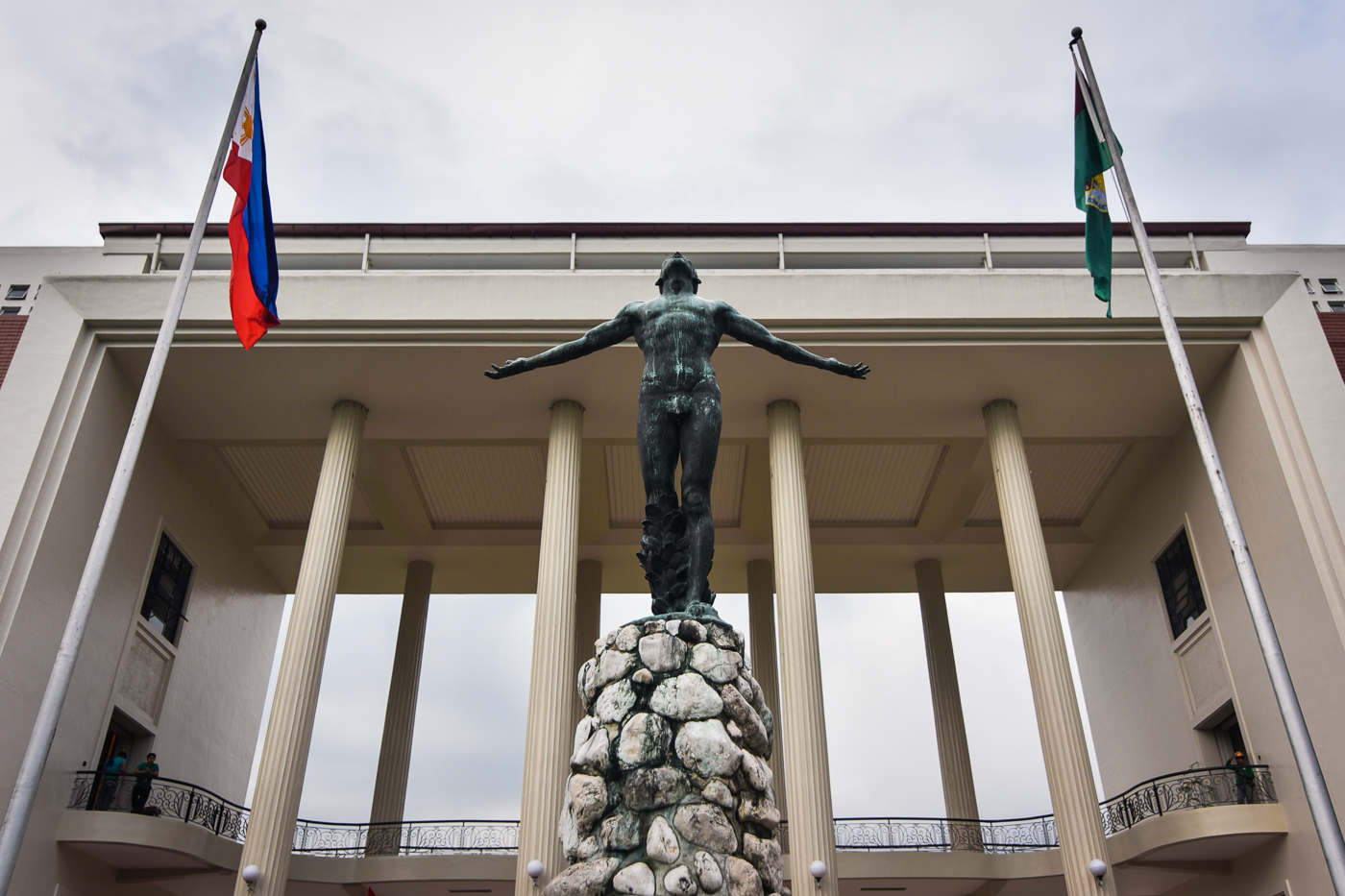
MANILA, Philippines– As the coronavirus disease continues to spread across the country, the University of the Philippines (UP) has risen to the challenge of lending its expertise and resources to stem the new virus.
With 8 constituent universities across the archipelago, several UP campuses have led initiatives to help reduce the impact of the coronavirus outbreak in their communities.
UP Diliman’s Palma Hall opened its doors to become an isolation area for suspected and probable coronavirus cases in the area.
Standing tall as the university’s largest classroom building complex, Palma Hall has long been a staging ground and center for UP Diliman’s social engagement.
The first floor lobby and classrooms will be isolation area. The classrooms on the second and third floors might be used for that purpose as well.
Fifty beds have been set up in the building – two in each classroom with plastic screens separating the bed areas.
Meanwhile, the UP Asian Institute of Tourism (AIT) offered its space as a COVID-19 testing center in Quezon City.
The testing center at AIT, which is equipped with swab booths, targets 50 tests per day. The specimens are forwarded for processing to the Lung Center of the Philippines and St Luke’s Medical Center-Quezon City.
Quick response to COVID-19
After Chinese scientists released the whole genome sequence of the virus to the public, several scientists at the National Institutes of Health of UP Manila were quick to develop a testing kit as early as February.
Priced at P1,320, the kit is said to be 6 times cheaper than its foreign counterpart, which costs around P8,500. The kit provides results in two hours. (READ: #SalamatUP: Netizens laud U.P. scientists for developing coronavirus testing kits)
Despite the early innovation, the testing kit was only allowed for mass use starting April 4.
Taking on the challenge, the UP-Philippine General Hospital (UP PGH) heeded the Department of Health's request to be a coronavirus referral hospital in the Philippines, while still juggling other patients.
PGH, according to its website, is considered as the biggest modern government tertiary hospital in the Philippines, servicing more than 600,000 patients every year and catering especially to poor Filipinos. It remains as the only national referral center for tertiary care.
Science for the people
To help address the outbreak, UP Diliman has been utilizing the wonders of science to serve the people. Its College of Science has lent its qPCR machines for COVID-19 testing and 3D printers for personal protective equipment (PPE) production.
It also deployed members from the Institute of Biology and the National Institute of Molecular Biology and Biotechnology to join frontliners who can perform COVID-19 tests.
Laboratories in the college have also donated supplies to public hospitals. A model for disease transmission is also in the works to propose the best next move to the national government.
Meanwhile, a team of UP chemists produced alcohol sanitizers following the World Health Organization’s formulation to provide added protection for UP Diliman constituents, dormers, and UP PGH.
“All these efforts are being done because our standing mandate as UP scientists is to make science serve the people,” CS Associate Dean Lillian Rodriguez told the UP Media and Public Relations Office.
Extending a helping hand
Seeking to further improve access to information, UP-PGH launched its Bayanihan Na! COVID-19 Operations Center on March 30 to answer queries related to COVID-19.
In close partnership with the Philippine Long Distance Telephone Company (PLDT), the hotline 155-200 is open to the public 24/7. This aims to provide assistance as well as mitigate the influx of patients in hospitals by being able to consult with professionals faster.
At the same time, UPD Psychosocial Services (PsycServ) program with the UPD Department of Psychology is offering free telepsychotherapy services to frontliners and individuals in a bid to help those affected by the outbreak.
PsycServ operates only from Monday to Friday, from 9 am to 5 pm, and can be accessed through http://bit.ly/PsycServPH.
The UP College of Law, for its part, sought ways to offer its services during the outbreak through free legal assistance. Those who find themselves becoming victims of discrimination may reach out for help through https://law.upd.edu.ph/uplawhelps/ and uplawhelps@up.edu.ph.
The line is operational only from 8 am to 12 pm, and 1 pm to 5 pm from Monday to Friday.
Using arts and literature in service of the people
Aside from work in medicine and the sciences, UP also contributes to the fight against COVID-19 through the arts and humanities as well.
On April 7, the Department of Speech and Communication and Theatre Arts (DSCTA) of the College of Arts and Letters’ (CAL) Dulaang Unibersidad ng Pilipinas (DUP) streamed 3 of its plays on its Youtube page for free.
Meanwhile, Professor Eilene Antoinette G. Narvaez of UP’s Departamento ng Filipino at Panitikan ng Pilipinas has translated terminologies related to COVID-19 to Filipino to make the information accessible to more people.
A similar effort was launched by the UP College of Education, which created a dictionary for children to understand common COVID-19 terms found in the news. The dictionary is in English and Filipino, and can be found here. – Rappler.com
Giana Danielle Larrauri is a Mover from Taytay Rizal and the Editor-in-Chief of SINAG, the official student publication of the College of Social Sciences and Philosophy, University of the Philippines-Diliman. She is a 4th year BA Philosophy student.